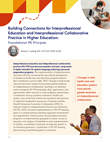How To: Understand the Basics of Interprofessional Education and Practice
Changes in both health care and education systems have placed greater emphasis on interprofessional collaboration—resulting in an identified need to integrate interprofessional education and interprofessional practice (IPE/IPP) knowledge, skills, applications, and opportunities within curricula to meet workplace expectations. Denise A. Ludwig, PhD, CCC-SLP, FNAP, ACUE, a professor at Grand Valley State University (GVSU), describes the foundational principles of IPE and IPP along with real life examples for implementing IPE/IPP in higher education, school-based programs for K–12, and health care. Read this case study to learn more about the drivers, competencies, strategies, and successful IPE/IPP programs implemented at GVSU, home to the Midwest Interprofessional Practice, Education, and Research Center (MIPERC)
Grand Valley State University (GVSU)
Case study from Denise Ludwig, PhD, CCC-SLP, FNAP, ACUE [PDF]
Whether you are a working professional or a student preparing for a career, you need the skills to succeed on interprofessional teams. In this webinar, you will learn what interprofessional practice (IPP) is and the competencies that you need to successfully participate in these teams. This course covers how to foster collaborative teams in various work settings and maximize your effectiveness as a team member.
Learning Outcomes
After viewing this webinar, you will be able to
- List the benefits of interprofessional education (IPE) and interprofessional practice (IPP)
- Describe the skills that individuals need in order to work on interprofessional teams
- Identify which skills you should develop to increase interprofessional collaboration in your work.
What's Covered?
This webinar features the following:
- Definitions for the terms interprofessional education and interprofessional practice.
- Factors influencing the move to collaborative practice.
- Models of IPE/IPP in education and health care settings.
- Competencies [PDF] needed to successfully work on IPP teams. The video references the 2016 IPEC Core Competencies. When viewing the video, refer to the IPEC Core Competencies Version 3 (November 2023).
- Resources and strategies for promoting IPE/IPP in your workplace.
- Patients, students, and families sharing their positive experiences with interprofessional collaboration in a health care or education setting.
- Videos of patients, students, and family members who had negative experiences due to lack of collaboration.
- Guide to discussion and interactive sharing (if listening to the webinar with a group).
- Frequently asked questions about IPE/IPP—with answers from the presenters.
Webinar and Resource Materials
- View the webinar
- IPEC Competencies [PDF] - November 2023
- Special Interest Group eBook: Interprofessional Education and Interprofessional Practice in Communication Sciences and Disorders: An Introduction and Case-Based Examples of Implementation in Education and Health Care Settings [PDF]
- Slides [PDF]
Presenters
- Deborah Dixon, MA, CCC-SLP, former Director of School Services, ASHA
- Ellen Fagan, EdD, CCC-SLP, former Director of Continuing Education, ASHA
- Lemmietta McNeilly, PhD, CCC-SLP, Chief Staff Officer for Speech-Language Pathology, ASHA
- Loretta Nunez, AuD, CCC-SLP/A, Director of Academic Affairs and Research Education, ASHA
Read the presenter bios and disclosures [PDF].











